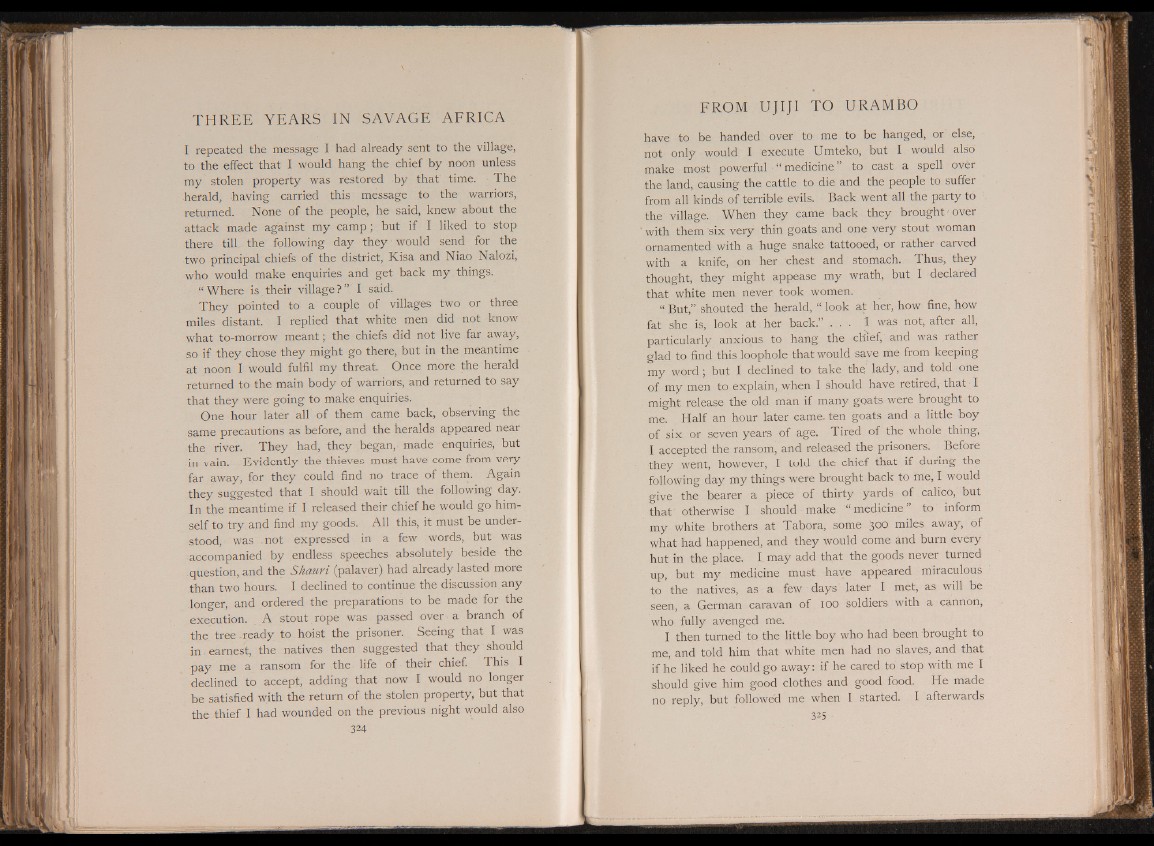
I repeated the message I had already sent to the village,
to the effect that I would hang the chief by noon unless
my stolen property was restored by that time. The
herald, having carried this message to the warriors,
returned. None of the people, he said, knew about the
attack made against my camp; but if I liked to stop
there till the following day they would send for the
two principal chiefs of the district, JCisa and Niao Nalozi,
who would make enquiries and get back my . things.
“ Where is their village ? ” I said.
They pointed to a couple of villages two or three
miles distant. I replied that white men did not know
what to-morrow meant; the chiefs did not live far away,
so if they chose they might go there, but in the meantime
at noon I would fulfil my threat. Once more the herald
returned to the main body of warriors, and returned to say
that they were going to make enquiries.
One hour later all of them came back, observing the
same precautions as before, and the heralds appeared near
the river. They had, they began, made enquiries, but
in vain. Evidently the thieves must have come from very
far away, for they could find no trace of them. Again
they suggested that I should wait till the following day.
In the meantime if I released their chief he would go himself
to try and find my goods. All this, it must be understood,
was . not expressed in a few words, but was
accompanied by endless speeches- absolutely beside the
question, and the Shauri (palaver) had already lasted more
than two hours. I declined to continue the discussion any
longer, and ordered the preparations to be made for the
execution. A stout rope was passed over a branch of
the tree-ready, to. hoist the prisoner. Seeing that I was
in. earnest, the natives then suggested that they should
pay me a ransom for the life of their chief. This I
declined to accept, adding that now I would no longer
be satisfied with the return of the stolen property, but that
the thief I had wounded on the previous night would also
324
have to be handed over to me to be hanged, or else,
not only would I execute Umteko, but I would also
make most powerful “ medicine ” to cast a spell over
the land, causing the cattle to die and the people to suffer
from all kinds of terrible evils. Back went all the party to
the village. When they came back they brought'over
with them six very thin goats and one very stout woman
ornamented with a huge snake tattooed, or rather carved
with a knife, on her chest and stomach. Thus, they
thought, they might appease my wrath, but I declared
that white men never took women.
“ But,” shouted the herald, “ look at her, how fine, how
fat she is, look at her back.” . . . I was not, after all,
particularly anxious to hang the chief, and was rather
glad to find this loophole that would save me from keeping
my word ; but I declined to take the lady, and told one
of my men to explain, when I should have retired, that I
might release the old man if many goats were brought to
me. Half an hour later came- ten goats and a little boy
of six or seven years of age. Tired of the whole thing,
I accepted the ransom, and released the prisoners. Before
they went, however, I told the chief that if during the
following day my things were brought back to me, I would
give the bearer a piece of thirty yards of calico, but
that otherwise I should make “ medicine” to inform
my white brothers at Tabora, some 300 miles away, of
what had happened, and they would come and burn every
hut in the place. I may add that the goods never turned
up, but my medicine must have appeared miraculous
to the natives, as a few days later I met, as will be
seen, a German caravan of 100 soldiers with a cannon,
who fully avenged me.
I then turned to the little boy who had been brought to
me, and told him that white men had no slaves, and that
if he liked he could go away: if he cared to stop with me I
should give him good clothes and good food. He made
no reply, but followed me when I started. I afterwards
32s I